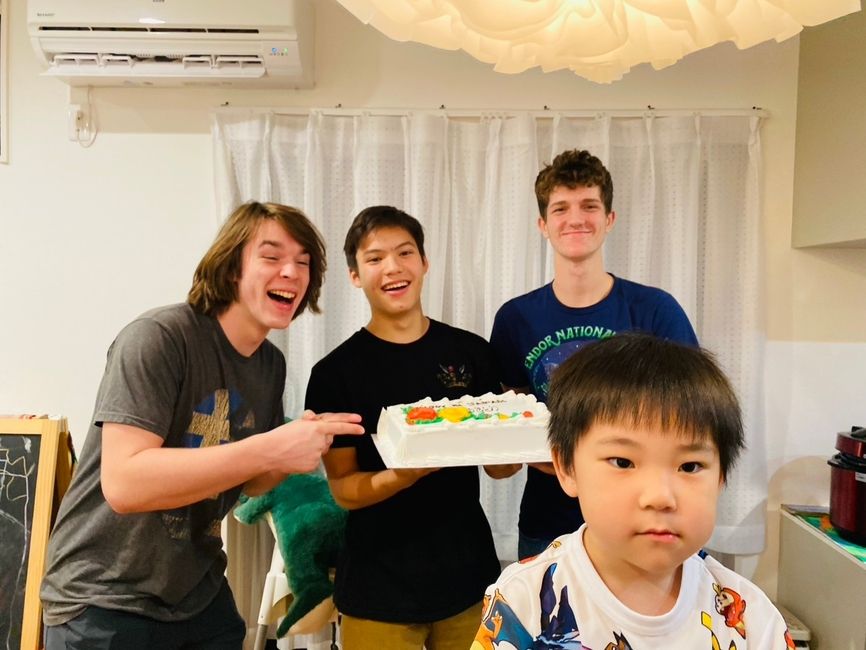A Guide to Studying in Japan in High School
Post written by CIEE Global Ambassador Gavin Freese who is currently participating in CIEE’s High School Abroad Program in Japan for the academic year. In this post, Gavin expresses how studying abroad in Japan is not just about language and academics, but about immersing oneself in a culture of respect and discipline which has deeply transformed his perspective on life.
Studying abroad is an experience like no other. It’s more than just learning a new language or experiencing a different school system—it’s about immersing yourself in a culture, gaining a new perspective on life, and growing as an individual. As someone currently studying at Ritsumeikan High School in Uji, Kyoto, I can say without hesitation that Japan has completely transformed how I view the world. If you’re considering studying in Japan, here’s a guide filled with personal insights and practical advice to help you make the most of this incredible opportunity.
Culture
Japan is a country that has fascinated me long before I stepped foot here. From the food to the traditions to the technology, it’s a place where old-world charm and cutting-edge innovation exist side-by-side. But beyond the attractions, Japan’s emphasis on respect, discipline, and education makes it an excellent destination for high school students looking to study abroad.
One of the first things I noticed when I arrived is how clean and orderly everything is. The streets, the train stations, even the bathrooms—everywhere you go, you’ll be amazed by how well-maintained the public spaces are. This reflects Japan’s deeply ingrained cultural values, where every person takes pride in keeping their environment neat and orderly.
Another thing I love most about Japan is the culture of respect. It’s reflected in everything, from how people bow to each other as a sign of politeness to the etiquette around public transportation. In the train stations, for example, there are clear rules about where to line up and how to behave quietly in the trains. If you ever forget, don’t worry—there’s always someone willing to remind you in the gentlest way.
Additionally, Japan places a strong emphasis on punctuality, which may be a bit of an adjustment if you’re not used to always being on time. But after a while, you’ll come to appreciate how everything runs like clockwork, and you’ll learn to plan your day with precision.
School Life
At Ritsumeikan High School, my daily life is both challenging and rewarding. The school system in Japan is quite different from what you might be used to in your home country. For starters, the school day tends to be longer, with students often attending school from around 8:40 AM to 5:30 PM. This may sound intense, but it’s all part of Japan’s rigorous approach to education.
Aside from academics, extracurricular activities are a big part of school life. I’m part of the wrestling team, and it’s one of the highlights of my experience here. Sports are taken seriously, and there’s a sense of camaraderie among teammates that helps to strengthen the bonds between students. I’ve learned a lot not only in terms of athletic skills but also in terms of discipline, teamwork, and resilience.
Commuting to school is another aspect that differs from what I’m used to. I walk 17 minutes to the train station, take a 15-minute train ride, and then walk another 30 minutes to school. It’s an entirely different rhythm to life, but surprisingly enjoyable. The daily commute gives me time to observe the culture up close—from the quiet yet efficient train stations to the friendly interactions I have with strangers along the way.
Language Learning
One of the most common concerns for students planning to study in Japan is the language barrier. Japanese is a challenging language to learn, especially for beginners, but don’t let that intimidate you. As a high school student immersed in the language, I can tell you that the key to overcoming this challenge is immersion. You’ll be surrounded by the language every day, and even if you’re not fluent at first, you’ll gradually start picking up more and more through daily interactions.
One thing I’ve noticed is that Japanese people are incredibly patient and willing to help you, especially when they see that you’re trying to speak their language. Whether it’s a teacher, a shopkeeper, or a classmate, you’ll find that people will take the time to help you understand or practice. Just remember: the goal is to learn and improve, not to be perfect right away.
That said, it’s still very helpful to study some Japanese before arriving. Basic phrases, such as greetings, ordering food, or asking for directions, will make your transition much smoother. If you can learn hiragana and katakana (two Japanese writing systems), that will also help tremendously in understanding signs and menus.
Life Abroad
Life in Japan is very different from what you might be used to, but that’s part of the beauty of studying abroad. You’ll get to experience a whole new world of customs, traditions, and ways of living.
If you’re thinking of studying abroad, I highly recommend considering the CIEE high school abroad in Japan, which is the one I’m currently participating in. CIEE offers a comprehensive study abroad experience, connecting students with host families, cultural excursions, and language support, all while helping you navigate the challenges of studying in a new country.
CIEE has been incredibly supportive in helping me adjust to life in Japan. They provide resources for language learning, cultural immersion, and even opportunities to meet other international students. It’s one of the best ways to ensure that your time in Japan is enriching and well-rounded.
Ambassador Abroad
Being an Ambassador Abroad is not a formal requirement for studying in Japan, but it has been a huge part of my experience. Through this role, I’ve had the opportunity to share my journey with others, whether through photos, videos, blogs, or simple conversations. It’s helped me reflect on what I’ve learned and connect with people in new ways.
What being an ambassador has taught me most is how important it is to share perspectives—whether through a snapshot of daily life or by telling a story about cultural differences. Studying abroad isn’t just about what you take in; it’s also about what you give back. By documenting your experience, you not only preserve your memories but also help others understand and appreciate the world from your point of view.
Life-Changing Adventure
Studying abroad in Japan is an experience that will change your life. It’s a place of deep tradition and forward-thinking innovation, where respect and discipline permeate daily life. While the language and cultural differences may be challenging at first, you’ll quickly adapt, especially if you come with an open mind and a willingness to learn. My time in Japan has been filled with unforgettable moments, and I wouldn’t trade it for anything. If you can study here, don’t hesitate—there’s so much waiting for you to discover!


